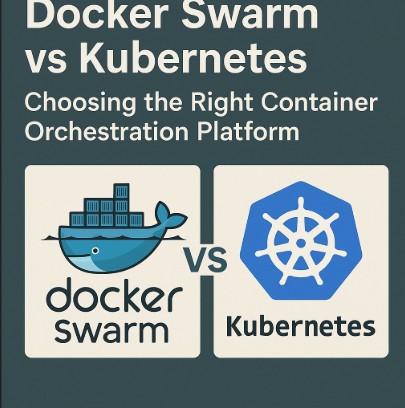Choosing the right container orchestration platform is crucial for any organization looking to deploy and manage containerized applications at scale. Two prominent players in this space are Docker Swarm and Kubernetes. Understanding the nuances of Docker Swarm Kubernetes and their respective strengths and weaknesses is vital for making an informed decision.
This article provides a comprehensive comparison of these platforms, helping you determine which best suits your needs and infrastructure. We’ll delve into their architecture, features, scalability, and ease of use, ultimately guiding you towards the optimal solution for your container orchestration requirements.
Table of Contents
Understanding Container Orchestration
Before diving into the specifics of Docker Swarm Kubernetes, let’s establish a foundational understanding of container orchestration. In essence, container orchestration automates the deployment, scaling, and management of containerized applications across a cluster of machines. This automation simplifies complex tasks, ensuring high availability, efficient resource utilization, and streamlined workflows. Without orchestration, managing even a small number of containers can become incredibly challenging, especially in dynamic environments.
Docker Swarm: Simplicity and Ease of Use
Docker Swarm is a native clustering solution for Docker. Its primary advantage lies in its simplicity and ease of use, making it a great choice for developers already familiar with the Docker ecosystem. Swarm integrates seamlessly with Docker Engine, requiring minimal learning curve to get started.
Architecture and Functionality
Docker Swarm employs a simple, master-worker architecture. A single manager node coordinates the cluster, while worker nodes execute containers. This architecture simplifies deployment and management, particularly for smaller-scale deployments. Swarm uses a built-in service discovery mechanism, making it straightforward to manage and scale applications.
Pros and Cons of Docker Swarm
- Pros: Simple to learn and use, easy integration with Docker, good for smaller deployments, minimal operational overhead.
- Cons: Less feature-rich compared to Kubernetes, limited scalability for large-scale deployments, less mature ecosystem and community support.
Kubernetes: Robustness and Scalability
Kubernetes, often referred to as K8s, is a far more powerful and complex container orchestration platform. While it has a steeper learning curve than Docker Swarm, it offers significantly enhanced features, scalability, and community support, making it the preferred choice for large-scale deployments and complex application architectures.
Architecture and Functionality
Kubernetes employs a more sophisticated master-worker architecture with a richer set of components, including a control plane (master nodes) and a data plane (worker nodes). The control plane manages the cluster state, schedules deployments, and ensures the health of the pods. The data plane hosts the actual containers.
Key Kubernetes Concepts
- Pods: The smallest deployable unit in Kubernetes, typically containing one or more containers.
- Deployments: Manage the desired state of a set of pods, ensuring the correct number of replicas are running.
- Services: Abstract away the underlying pods, providing a stable IP address and DNS name for accessing applications.
- Namespaces: Isolate resources and applications within the cluster, enhancing organization and security.
Pros and Cons of Kubernetes
- Pros: Highly scalable and robust, extensive feature set, large and active community support, rich ecosystem of tools and integrations, supports advanced features like autoscaling and self-healing.
- Cons: Steeper learning curve, more complex to manage, greater operational overhead, requires more advanced infrastructure knowledge.
Docker Swarm vs. Kubernetes: A Detailed Comparison
This section presents a direct comparison of Docker Swarm Kubernetes across various key aspects. This detailed analysis will assist in your decision-making process, allowing you to choose the most appropriate platform based on your needs.
| Feature | Docker Swarm | Kubernetes |
|---|---|---|
| Scalability | Limited, suitable for smaller deployments | Highly scalable, designed for large-scale deployments |
| Complexity | Simple and easy to use | Complex and requires advanced knowledge |
| Learning Curve | Shallow | Steep |
| Feature Richness | Basic features | Extensive features, including advanced networking, storage, and security |
| Community Support | Smaller community | Large and active community |
| Ecosystem | Limited ecosystem | Rich ecosystem of tools and integrations |
| Cost | Generally lower operational costs | Potentially higher operational costs due to complexity |
Choosing Between Docker Swarm and Kubernetes
The choice between Docker Swarm Kubernetes depends heavily on your specific needs and circumstances. Consider the following factors:
- Scale of Deployment: For small-scale deployments with simple applications, Docker Swarm is sufficient. For large-scale deployments requiring high availability, scalability, and advanced features, Kubernetes is the better choice.
- Team Expertise: If your team has extensive experience with Docker and a relatively small application, Docker Swarm is a good starting point. If your team has the skills and experience for the complexities of Kubernetes, it opens a world of advanced features and scaling options.
- Application Complexity: Simple applications can be effectively managed with Docker Swarm. Complex applications requiring advanced networking, storage, and security features benefit from Kubernetes’ extensive capabilities.
- Long-term Vision: If you anticipate significant growth in the future, Kubernetes is a more future-proof investment.
Frequently Asked Questions
Q1: Can I migrate from Docker Swarm to Kubernetes?
A1: Yes, migrating from Docker Swarm to Kubernetes is possible, although it requires planning and effort. Tools and strategies exist to help with the migration process, but it’s not a trivial undertaking. The complexity of the migration depends on the size and complexity of your application and infrastructure.
Q2: What are some common Kubernetes best practices?
A2: Some key Kubernetes best practices include using namespaces to organize resources, defining clear deployment strategies, utilizing persistent volumes for data storage, implementing proper resource requests and limits for containers, and employing robust monitoring and logging solutions.
Q3: Is Kubernetes suitable for small teams?
A3: While Kubernetes is commonly associated with large-scale deployments, it can be used by smaller teams. Managed Kubernetes services simplify many operational aspects, making it more accessible. However, smaller teams should carefully assess their resources and expertise before adopting Kubernetes.
Q4: What is the difference in cost between Docker Swarm and Kubernetes?
A4: The direct cost of Docker Swarm and Kubernetes is minimal (mostly just the compute resources required to run the cluster). The difference lies in operational cost. Docker Swarm generally has a lower operational cost due to its simplicity, while Kubernetes can be more expensive due to the increased complexity and potentially higher resource needs.

Conclusion
Choosing between Docker Swarm Kubernetes requires careful consideration of your specific needs and resources. Docker Swarm offers a simpler, more accessible solution for smaller-scale deployments, while Kubernetes provides the robustness and scalability needed for complex, large-scale applications.
Understanding the strengths and weaknesses of each platform empowers you to make the right choice for your container orchestration strategy. Ultimately, the best choice depends on your current needs, projected growth, and team expertise. Weigh the pros and cons carefully to select the platform that best aligns with your long-term goals for your containerized infrastructure.
For further information, consult the official documentation for Docker Swarm and Kubernetes.
Additionally, explore articles and tutorials on Kubernetes from reputable sources to deepen your understanding. Thank you for reading the DevopsRoles page!

